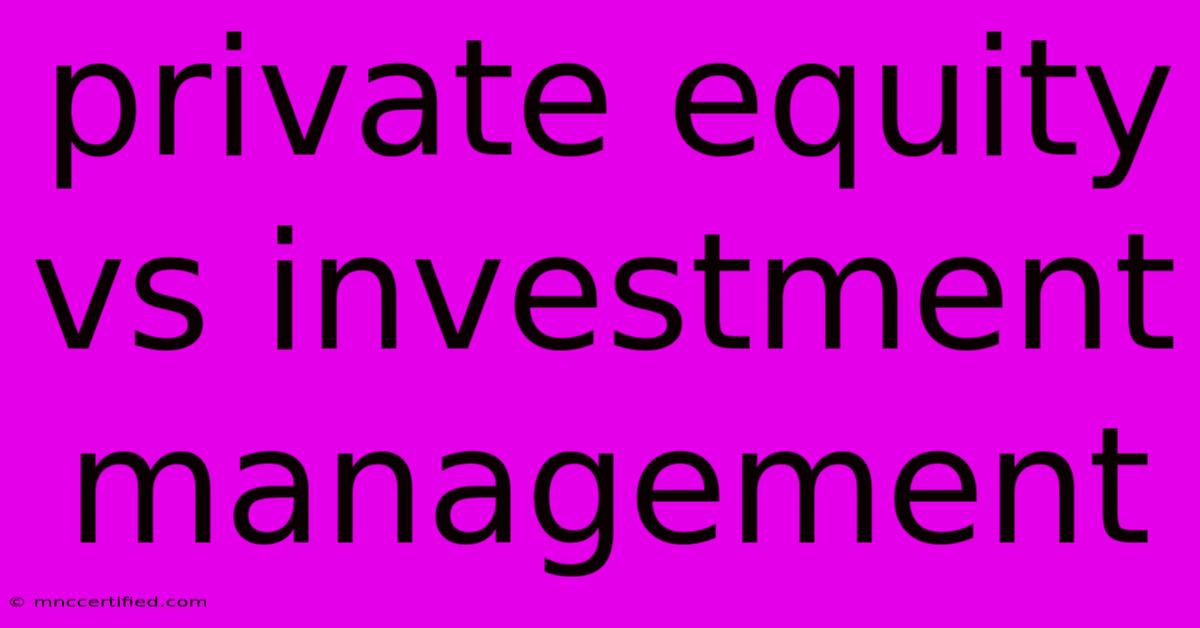Private Equity Vs Investment Management

Table of Contents
Private Equity vs. Investment Management: Unpacking the Differences
The world of finance offers a vast landscape of investment opportunities, and understanding the nuances between different investment vehicles is crucial for making informed decisions. Two prominent categories that often spark confusion are private equity and investment management. While both involve managing capital and aiming for returns, their approaches and target markets differ significantly. This article delves into the key distinctions between private equity and investment management, helping you navigate these complex financial concepts with clarity.
Understanding Private Equity: Investing in Private Companies
Private equity refers to equity investments in companies that are not publicly traded on stock exchanges. These investments often involve acquiring a controlling stake in a company or providing capital for expansion, restructuring, or buyouts.
Key characteristics of private equity include:
- Illiquidity: Private equity investments are generally considered illiquid, meaning it can be challenging to quickly sell your stake.
- Long-term focus: Private equity firms typically hold investments for several years, aiming to unlock value through active management and strategic interventions.
- High risk, high reward: The potential for high returns is coupled with higher risks due to the lack of public market liquidity and the inherent challenges of managing privately held companies.
- Active management: Private equity firms actively participate in the companies they invest in, often taking board seats and influencing strategic decisions.
Examples of private equity investments:
- Buyouts: Acquiring a majority stake in a company, typically with the goal of restructuring and improving performance.
- Venture capital: Investing in early-stage companies with high growth potential.
- Growth capital: Providing funding to established companies for expansion or new initiatives.
- Distressed debt: Investing in companies facing financial difficulties, often with the aim of restructuring the debt and turning the business around.
Investment Management: Diversifying Across Public Markets
Investment management encompasses a broader spectrum of investment activities, primarily focused on managing assets in publicly traded markets. This involves selecting and managing a portfolio of stocks, bonds, real estate, and other assets to achieve specific financial goals.
Key characteristics of investment management include:
- Liquidity: Investments in publicly traded markets are typically highly liquid, allowing investors to buy and sell assets easily.
- Diversification: Investment managers strive to create diversified portfolios across different asset classes and sectors, mitigating risk and maximizing potential returns.
- Passive vs. active management: Investment management can be passive, tracking market indices, or active, where fund managers actively select investments based on market analysis and strategies.
Examples of investment management services:
- Mutual funds: Pools of money from multiple investors managed by a professional fund manager.
- Exchange-traded funds (ETFs): Similar to mutual funds but traded on stock exchanges, offering greater flexibility.
- Hedge funds: Employing complex strategies to generate returns in various market conditions.
- Robo-advisors: Using technology to automate investment management based on algorithms and risk tolerance.
Choosing the Right Path: Private Equity vs. Investment Management
The choice between private equity and investment management largely depends on your investment goals, risk tolerance, and financial resources.
Private equity is suitable for:
- High-net-worth individuals and institutions with a long-term investment horizon and a higher risk appetite.
- Investors seeking active involvement and influence in the companies they invest in.
- Those aiming for potentially high returns but willing to accept the illiquidity and complexity of private markets.
Investment management is suitable for:
- Individuals with varying investment goals and risk profiles.
- Investors seeking diversified portfolios across public markets.
- Those who prefer a more passive approach to investment management.
Key Considerations:
- Investment horizon: Private equity requires a longer investment timeframe due to its illiquidity.
- Risk tolerance: Private equity investments are generally higher risk than publicly traded assets.
- Fees and expenses: Both private equity and investment management involve fees, which can vary significantly based on the firm and strategy.
Conclusion: Navigating the Investment Landscape
Both private equity and investment management offer unique opportunities for investors with distinct investment profiles. By understanding the key differences, you can choose the path that aligns with your financial goals, risk tolerance, and investment horizon. Thorough research, professional advice, and a well-defined investment strategy are crucial for success in this complex and dynamic financial landscape.

Thank you for visiting our website wich cover about Private Equity Vs Investment Management. We hope the information provided has been useful to you. Feel free to contact us if you have any questions or need further assistance. See you next time and dont miss to bookmark.
Featured Posts
-
Mtn Laurel Associates Insurance Premium
Nov 09, 2024
-
Twin City Fire Insurance Company Claims
Nov 09, 2024
-
New Mike Tyson And Jake Paul Chibi Nfts Released
Nov 09, 2024
-
Massmutual Disability Insurance Reviews
Nov 09, 2024
-
Ucla Defeats Iowa Despite Offensive Woes
Nov 09, 2024